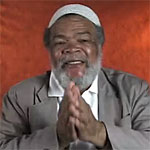African Sojourner, 1964.
During his two extended journeys through Africa and the Middle East in 1964, Malcolm X gained new insights into the problem of racism. In his Autobiography, he later wrote: “I was no less angry than I had been, but at the same time the true brotherhood I had seen had influenced me to recognize that anger can blind human vision.” He now believed that race war was not inevitable, and felt that “America is the first country … that can actually have a bloodless revolution.”
Malcolm X’s new political strategy called for building black community empowerment, through tools such as voter registration and education, economic self-sufficiency, and the development of independent politics. He called upon African Americans to transform the civil rights movement into a struggle for international human rights.
ADDITIONAL READINGS:
Breitman, ed., Malcolm X Speaks, pp. 72-87.
De Caro, On the Side of My People, Chapter 18, pp. 230-245.
MSE: Multimedia Index: Malcolm X, “Defining the situation of Afro-Americans as a human rights problem,” Cairo: WTN, July 17, 1964.
Albert Cleage and George Breitman, “Myths About Malcolm X: Two Views,” International Socialist Review 28 (September/October 1967), pp. 33-60.
Claude Andrew Clegg III, Chapter 7, “Trials and Tribulations,” An Original Man: The Life and Times of Elijah Muhammad, pp. 149-189.
“Malcolm X Flees For His Life,” Pittsburgh Courier, July 11, 1964, p. 4.  “Malcolm X Bids Africans, Take Negro Issue to U.N.,” New York Times, July 18, 1964, p. 2.
“Malcolm X Bids Africans, Take Negro Issue to U.N.,” New York Times, July 18, 1964, p. 2.  “Malcolm X Lays Harlem Riot To ‘Scare Tactics’ of Police,” New York Times, July 21, 1964, p. 22.
“Malcolm X Lays Harlem Riot To ‘Scare Tactics’ of Police,” New York Times, July 21, 1964, p. 22.  “Beware of False Prophets,” Muhammad Speaks, July 31, 1964, pp. 1, 3, 8.
“Beware of False Prophets,” Muhammad Speaks, July 31, 1964, pp. 1, 3, 8.  pt 1 |
pt 1 |  pt 2 |
pt 2 |  pt 3
Handler, “Malcolm X Seeks U.N. Negro Debate,” New York Times, August 13, 1964, p. 22.
pt 3
Handler, “Malcolm X Seeks U.N. Negro Debate,” New York Times, August 13, 1964, p. 22.  “Mr. Muhammad Speaks: Calls Malcolm X Greatest Hypocrite He’s Ever Seen,” Pittsburgh Courier, September 5, 1964, p. 19.
“Mr. Muhammad Speaks: Calls Malcolm X Greatest Hypocrite He’s Ever Seen,” Pittsburgh Courier, September 5, 1964, p. 19.  pt 1 |
pt 1 |  pt 2
“Order Eviction of MX,” Amsterdam News, September 5, 1964, p. 1.
pt 2
“Order Eviction of MX,” Amsterdam News, September 5, 1964, p. 1.  “Malcolm X Article Favors Goldwater,” New York Times, September 8, 1964, p. 19.
“Malcolm X Article Favors Goldwater,” New York Times, September 8, 1964, p. 19.  “Vicious Scheming and Treachery by Malcolm X,” “Biography of Hypocrite: By Two Muslim Brothers Who Knew Him Best,” Muhammad Speaks, September 25, 1964, p. 16.
“Vicious Scheming and Treachery by Malcolm X,” “Biography of Hypocrite: By Two Muslim Brothers Who Knew Him Best,” Muhammad Speaks, September 25, 1964, p. 16.  pt 1 |
pt 1 |  pt 2
“Malcolm Rejects Racist Doctrine,” New York Times, October 4, 1964, p. 59.
pt 2
“Malcolm Rejects Racist Doctrine,” New York Times, October 4, 1964, p. 59.  “Minister Exposed by Those Who Knew Him Through Life,” Muhammad Speaks, October 9, 1964, p. 5.
“Minister Exposed by Those Who Knew Him Through Life,” Muhammad Speaks, October 9, 1964, p. 5.  Liz Mazucci, “Going Back to Our Own: Interpreting Malcolm X’s Transition From ‘Black Asiatic’ to ‘Afro-American,’” Souls, Vol. 7, no. 1 (Winter 2005), pp. 66-83.
Liz Mazucci, “Going Back to Our Own: Interpreting Malcolm X’s Transition From ‘Black Asiatic’ to ‘Afro-American,’” Souls, Vol. 7, no. 1 (Winter 2005), pp. 66-83. 







 Max Stanford on Malcolm's model of resistance based in Africa
Max Stanford on Malcolm's model of resistance based in Africa Herman Ferguson on Malcolm's reception in Africa
Herman Ferguson on Malcolm's reception in Africa Louis DeCaro on Malcolm's relations with African counterparts
Louis DeCaro on Malcolm's relations with African counterparts Abdur-Raazaq on threats to Malcolm overseas
Abdur-Raazaq on threats to Malcolm overseas